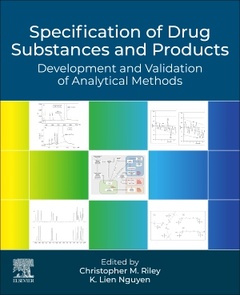Description
Specification of Drug Substances and Products (3rd Ed.)
Development and Validation of Analytical Methods
Coordinators: Riley Christopher M., Nguyen K. Lien
Language: English
Subject for Specification of Drug Substances and Products:
Keywords
Pharmaceutical Analysis; Drug Substance; Drug Product; Specifications; Method Validation; Method Development; Regulatory Guidelines and Requirements; International Regulations; Pharmacopeial Requirements; Regional Requirements; Statistical Considerations; Analytical Procedure Life Cycle Management; Analytical Target Profiles; Clinical Trials Applications; Marketing Authorization Applications; Expiration Dating; Accelerated Stability Studies; Microbiological Testing; Oral drugs; Natural Products; Ophthalmic Products; Nanoparticles; Parenteral Products; Antibodies; Antibody-Drug Conjugates; Liposomes; Vaccines; Gene Therapy; Digital Drug Delivery Systems; Transdermal Products; Inhalation Products; Nasal Sprays
1190 p. · Paperback
Description
/li>Contents
/li>Biography
/li>Comment
/li>
Specification of Drug Substances and Products: Development and Validation of Analytical Methods, Third Edition contains chapters discussing the unique requirements for the universal critical quality attributes, as well as the specific tests required to characterize and control different types of products, ranging in complexity from small molecules in immediate release oral dosage forms to complex products such as drug-antibody conjugates and mRNA-based products. This substantially expanded revision of the second edition will serve as practical comprehensive reference for scientists, managers, educators, and consultants involved in the development and regulation of pharmaceutical products.
SECTION 1: INTRODUCTION 1. Introduction SECTION 2: REGULATORY CONSIDERATIONS AND STATISTICAL APPROACHES 2. General Principles and Regulatory Considerations: Specifications and Shelf-Life Setting 3. Specifications and Expiry Dates based on Accelerated Stability Studies 4. Analytical Procedure Life Cycle Management 5. Analytical Target Profiles for Quality Attributes 6. Process Analytical Technology 7. Pharmacopeial Methods and Tests ER 8. USP Monographs 9. British Pharmacopoeia 10. Submission, Review and Approval of Specifications and Analytical Procedures: Pre-Clinical and Clinical Phases 11. Submission, Review and Approval of Specifications and Analytical Procedures: Marketing Authorization Applications 12. Special Regional Requirements: ASEAN, ANVISA and WHO SECTION 3: Critical Quality Attributes 13. Description and Identification 14. Assay and Impurities: Specifications 15. Assay and Impurities: Method Development as Part of Analytical Life Cycle Management 16. Assay and Impurities: Validation 17. Mutagenic Impurities 18. Residual Solvents 19. Elemental and Inorganic Impurities 20. Extractables and Leachables 21. Microbiological Testing 22. Solid-State Characterization 23. Chiral Methods 24. Water Determination SECTION 4: DOSAGE FORMS AND PRODUCT TYPES 25. Orally Administered Dosage Forms 26. Topical Products 27. Transdermal Products 28. Inhalation Products and Nasal Sprays 29. Ophthalmic Products 30. General Parenteral Products 31. Specification of Biotechnology Products 32. Biotechnology Products 33. Antibodies and Antibody-Drug Conjugates 34. Oligonucleotides and m-RNA and DNA Delivery Systems 35. Liposomes 36. Vaccines 37. Gene Therapy 38. Nanoparticles 39. Digital Drug Delivery Systems 40. Natural Products Section 5: Biological Fluids 41 Bioanalysis of Biological Matrix Samples using Liquid Chromatography
Dr. Nguyen is Head of Chemistry, Manufacturing and C
- Presents critical assessment, potential impact, and application of the recent revisions to ICH guidelines on method validation (Q2), and specification setting (Q6), as well as the latest guideline on Analytical Method Development (Q14)
- Addresses comprehensive treatment of the development and validation of analytical methodologies used in the analysis, control, and specification of a variety of different types of dosage forms, ranging from traditional oral solid dosage to forms to, natural products, vaccines, and gene therapy.
- Presents detailed treatment of latest statistical approaches (including new approaches to the treatment of validation data method, specification setting, and shelf-life prediction)




